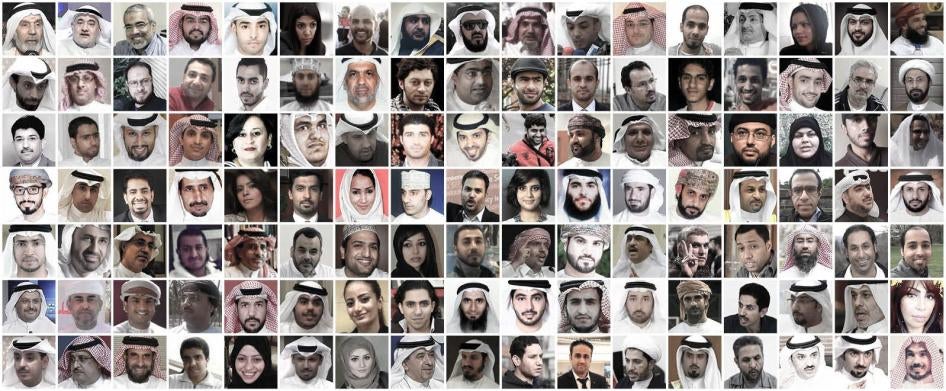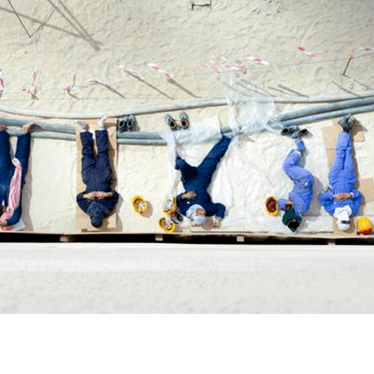(Beirut) – Gulf governments have sustained their campaigns to silence peaceful critics during the first half of 2017, Human Rights Watch said today, updating an interactive website, created in November 2016, featuring targeted human rights activists. On July 10, 2017, a Bahraini court sentenced human rights activist Nabeel Rajab to two years in prison on charges of “broadcasting false news” over tweets criticizing the Saudi-led Yemen war and Bahrain’s treatment of prisoners. Other prominent activists targeted during 2017 include Essam Koshak in Saudi Arabia and Ahmed Mansoor in the United Arab Emirates (UAE).
Gulf states’ contempt for freedom of expression has bled into the current Qatar crisis and blockade imposed by Saudi Arabia, the UAE, and Egypt. A list of demands to Qatar for ending the crisis from these countries included shutting down Al Jazeera, the international news site supported by Qatar’s government, and other media outlets allegedly funded by Qatar, a direct blow to media freedom.
“At a time when the gulf states’ open political divisions have rarely been more serious, these countries remain stubbornly united in their collective assault on their citizens’ right to free speech,” said Sarah Leah Whitson, Middle East director at Human Rights Watch. “Gulf states are reaching a new level of Orwellian reality when they throw citizens in jail for both criticizing other gulf nations and voicing public support for them.”
In a nod to Twitter’s 140-character limit, the interactive website presents the profiles of prominent Bahraini, Kuwaiti, Omani, Qatari, Saudi, and Emirati social and political rights activists and dissidents and describes their struggles to resist government efforts to silence them. All have faced government retaliation for exercising their right to freedom of expression, and many have been arrested, tried, and sentenced to fines or prison. In addition to Koshak, Rajab, and Mansoor, other profiled activists include Zainab al-Khawaja from Bahrain, Waleed Abu al-Khair and Mohammed Fahad al-Qahtani from Saudi Arabia, and Mohammed al-Roken from the UAE. The website includes new profiles and updates other profiles.
Hundreds of dissidents, including political activists, human rights defenders, journalists, lawyers, and bloggers have been imprisoned across the region, many after unfair trials and allegations of torture in pretrial detention. Gulf rulers’ sweeping campaigns against activists and political dissidents have included threats, intimidation, investigations, prosecution, detention, torture, and withdrawal of citizenship.
Koshak, a computer engineer, has used social media sites such as Twitter to push for human rights in Saudi Arabia, including highlighting the repression of peaceful activists and dissidents and advocating their release. The Saudi Criminal Investigation Department summoned him for questioning on January 8, 2017, without giving a reason, and detained him when he arrived. He has not been charged but remains in Mecca General Prison.
Rajab, co-founder of the Bahrain Centre for Human Rights (BCHR), has spent several periods in prison for his peaceful criticism of the Bahraini government. Authorities arrested Rajab on June 13, 2016, over tweets that criticized the Saudi-led war in Yemen and Bahrain's treatment of prisoners. On July 10, a Bahraini court sentenced him to two years in prison on charges of “spreading false news… in an attempt to discredit Bahrain,” “offending a foreign country [Saudi Arabia],” and “offending national institutions.”
Mansoor, an engineering student at Ajman University, is a prominent human rights activist and a member of the Human Rights Watch Middle East Advisory Committee. Informed sources have told rights groups that about a dozen security officers arrested Mansoor at his home in Ajman in the pre-dawn hours of March 20. The UAE’s official news agency, WAM, said on March 20 that Mansoor had been arrested on the orders of the Public Prosecution for cybercrimes and detained pending further investigation.
His family had no information on his whereabouts until authorities issued an official statement on March 29, saying he was in the Central Prison in Abu Dhabi. He is facing speech-related charges that include using social media websites to “publish false information that harms national unity.”
In addition to direct repression, gulf governments have acquired and deployed surveillance technology to track and monitor citizens’ online activity, including Mansoor’s.
In May 2016, Citizen Lab, a University of Toronto program that does research on advanced technology, security, and human rights, reported that it had discovered a campaign of spyware attacks by a sophisticated operator against Emirati journalists, activists, and dissidents. Though the attacker was unknown, circumstantial evidence suggested a link with the UAE government.
In August, Citizen Lab reported that Mansoor had received suspicious text messages on his iPhone promising information about detainees tortured in UAE jails if he clicked on an included link. Citizen Lab later said it discovered that clicking on the link would have installed sophisticated spyware on his iPhone that allows an outside operator to control his iPhone’s telephone and camera, monitor his chat applications, and track his movements.
On July 2, the Wall Street Journal reported that officials working with newly appointed Crown Prince Mohammad bin Salman purchased software to prevent criticism of the government by spying on Saudis online.
Gulf countries’ repression of political dissidents and activists based solely on their peaceful exercise of freedom of expression violates international human rights obligations. Article 32 of the Arab Charter on Human Rights, which all gulf countries other than Oman have ratified, guarantees “the right to information and to freedom of opinion and expression, as well as the right to seek, receive and impart information and ideas through any medium, regardless of geographical boundaries.”
“Gulf states are intimidating, surveilling, imprisoning, and silencing activists as part of their all-out assault on peaceful criticism,” Whitson said. “They should stop blocking gulf citizens from using social and other media to push for positive reforms.”









